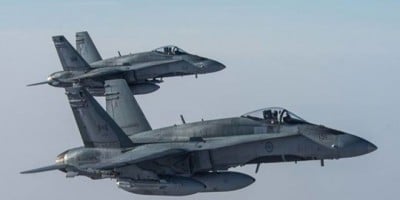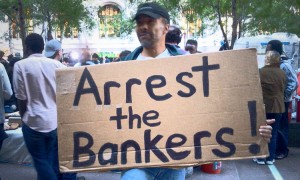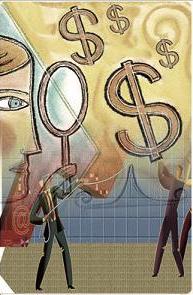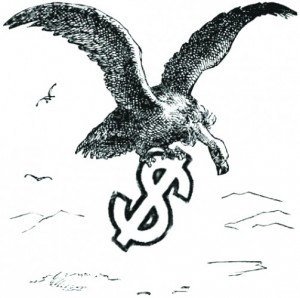
Paul Craig Roberts – former Assistant Secretary of the Treasury under President Reagan, former editor of the Wall Street Journal, listed by Who’s Who in America as one of the 1,000 most influential political thinkers in the world, PhD economist – wrote an article about the build up of hostilities between the U.S. and Russia titled, simply: “War Is Coming”.
Similarly, Ronald Reagan’s head of the Office of Management and Budget – David Stockman – is posting pieces warning of the dispute between the U.S. and Russia leading to World War 3.
Trend forecaster Gerald Celente – who has been making some accurate financial and geopolitical predictions for decades – says WW3 will start soon.
Investment fund manager and adviser Martin Armstrong has charted the “cycles of war” back to 600 BC … and says that we’ll have major wars between now and 2020. He has written pieces recently entitled, “Why We will Go to War with Russia“, and another one saying, “Prepare for World War III“.
 Investment adviser Larry Edelson – who has long studied the “cycles of war” – recently wrote:
Investment adviser Larry Edelson – who has long studied the “cycles of war” – recently wrote:
This year … we will also be hit by another ramping up of the related war cycles.
***
All part and parcel of the rising war cycles that I’ve been warning you about, conditions that will not abate until at least the year 2020.
Former Goldman Sachs technical analyst Charles Nenner – who has made some big accurate calls, and counts major hedge funds, banks, brokerage houses, and high net worth individuals as clients – says there will be “a major war”, which will drive the Dow to 5,000.
Veteran investor adviser James Dines forecast a war as epochal as World Wars I and II, starting in the Middle East.
What’s causing the slide towards war? We discuss several causes below.
Debt, Economic Collapse and Distraction
Martin Armstrong – who studies cycles, and managed multi-billion dollar sovereign investment funds – argues that war plans against Syria are really about debt and spending:
The Syrian mess seems to have people lining up on Capital Hill when sources there say the phone calls coming in are overwhelmingly against any action. The politicians are ignoring the people entirely. This suggests there is indeed a secret agenda to achieve a goal outside the discussion box. That is most like the debt problem and a war is necessary to relief the pressure to curtail spending.
Armstrong says the same thing caused Turkey to shoot down a Russian fighter jet over Syria:
This mess lies squarely in the hands of the Obama Administration and then to have the audacity to pretend Turkey had a right to defend its airspace when not being attacked is just too much. These people NEED war to distract everyone from the Sovereign Debt Crisis that is causing the collapse of governments for a system of borrowing year after year with ABSOLUTELY no intention of ever paying any debt off.
The same logic applies to Europe and other countries …
Armstrong writes:
Our greatest problem is the bureaucracy wants a war. This will distract everyone from the NSA and justify what they have been doing. They need a distraction for the economic decline that is coming.
 Billionaire hedge fund manager Kyle Bass notes:
Billionaire hedge fund manager Kyle Bass notes:
Trillions of dollars of debts will be restructured and millions of financially prudent savers will lose large percentages of their real purchasing power at exactly the wrong time in their lives. Again, the world will not end, but the social fabric of the profligate nations will be stretched and in some cases torn. Sadly, looking back through economic history, all too often war is the manifestation of simple economic entropy played to its logical conclusion. We believe that war is an inevitable consequence of the current global economic situation.
Billionaire investor Jim Rogers notes:
A continuation of bailouts in Europe could ultimately spark another world war, says international investor Jim Rogers.
***
“Add debt, the situation gets worse, and eventually it just collapses. Then everybody is looking for scapegoats. Politicians blame foreigners, and we’re in World War II or World War whatever.”
Economist and investment manager Marc Faber says that the American government will start new wars in response to the economic crisis:
Voodoo Economics
Many influential economists and talking heads hold the discredited belief that war is good for the economy.
Therefore, many are overtly or more subtly pushing for war.
Challengers Give Declining Empires “Itchy Fingers”
Historians say that declining empires tend to attack their rising rivals … so the risk of world war is rising because the U.S. feels threatened by the rising empire of China.
The U.S. government considers economic rivalry to be a basis for war. Therefore, the U.S. is systematically using the military to contain China’s growing economic influence.
Competition for Resources Is Heating Up
In addition, it is well-established that competition for scarce resources often leads to war. For example, Oxford University’s Quarterly Journal of Economics notes:
In his classic, A Study of War, Wright (1942) devotes a chapter to the relationship between war and resources. Another classic reference, Statistics of Deadly Quarrels by Richardson (1960),extensively discusses economic causes of war, including the control of “sources of essential commodities.”A large literature pioneered by Homer-Dixon (1991, 1999) argues that scarcity of various environmental resources is a major cause of conflict and resource wars (see Toset, Gleditsch, and Hegre 2000, for empirical evidence).
***
In the War of the Pacific (1879–1884), Chile fought against a defensive alliance of Bolivia and Peru for the control of guano [i.e. bird poop] mineral deposits. The war was precipitated by the rise in the value of the deposits due to their extensive use in agriculture.
***
Westing (1986) argues that many of the wars in the twentieth century had an important resource dimension. As examples he cites the Algerian War of Independence (1954–1962), the Six Day War (1967), and the Chaco War (1932–1935). More recently, Saddam Hussein’s invasion of Kuwait in 1990 was a result of the dispute over the Rumaila oil field. In Resource Wars (2001), Klare argues that following the end of the Cold War, control of valuable natural resources has become increasingly important, and these resources will become a primary motivation for wars in the future.
Former Federal Reserve chairman Alan Greenspan (and many world leaders) admitted that the Iraq war was really about oil, and former Treasury Secretary Paul O’Neill says that Bush planned the Iraq war before 9/11. And see this and this. Libya, Syria, Iran and Russia are all oil-producing countries as well …
Indeed, we’ve extensively documented that the wars in the Middle East and North Africa are largely about oil and gas. The wars in Syria and Iraq are about pipelines. The war in Gaza may be no exception. And see this. And Ukraine may largely be about gas as well.
And James Quinn and Charles Hugh Smith say we’re running out of all sorts of resources … which will lead to war.
Central Banking and Currency Wars
 We’re in the middle of a global currency war – i.e. a situation where nations all compete to devalue their currencies the most in order to boost exports. Brazilian president Rousseff said in 2010:
We’re in the middle of a global currency war – i.e. a situation where nations all compete to devalue their currencies the most in order to boost exports. Brazilian president Rousseff said in 2010:
The last time there was a series of competitive devaluations … it ended in world war two.
Jim Rickards agrees:
Currency wars lead to trade wars, which often lead to hot wars. In 2009, Rickards participated in the Pentagon’s first-ever “financial” war games. While expressing confidence in America’s ability to defeat any other nation-state in battle, Rickards says the U.S. could get dragged into “asymmetric warfare,” if currency wars lead to rising inflation and global economic uncertainty.
As does billionaire investor Jim Rogers:
Trade wars always lead to wars.
Given that China, Russia, India, Brazil and South Africa have joined together to create a $100 billion bank based in China, and that more and more trades are being settled in Yuan or Rubles – instead of dollars – the currency war is quickly heating up.
Indeed, many of America’s closest allies are joining China’s effort … which is challenging America and the Dollar’s hegemony.
Multi-billionaire investor Hugo Salinas Price says:
What happened to [Libya’s] Mr. Gaddafi, many speculate the real reason he was ousted was that he was planning an all-African currency for conducting trade. The same thing happened to him that happened to Saddam because the US doesn’t want any solid competing currency out there vs the dollar. You know Gaddafi was talking about a gold dinar.
Senior CNBC editor John Carney noted:
Is this the first time a revolutionary group has created a central bank while it is still in the midst of fighting the entrenched political power? It certainly seems to indicate how extraordinarily powerful central bankers have become in our era.
Robert Wenzel of Economic Policy Journal thinks the central banking initiative reveals that foreign powers may have a strong influence over the rebels.
This suggests we have a bit more than a ragtag bunch of rebels running around and that there are some pretty sophisticated influences. “I have never before heard of a central bank being created in just a matter of weeks out of a popular uprising,” Wenzel writes.
Indeed, some say that recent wars have really been about bringing all countries into the fold of Western central banking.
Runaway Inequality
 Paul Tudor Jones – founder of the Tudor Investment Corporation and the Tudor Group, which trade in the fixed-income, equity, currency and commodity markets – said recently:
Paul Tudor Jones – founder of the Tudor Investment Corporation and the Tudor Group, which trade in the fixed-income, equity, currency and commodity markets – said recently:
This gap between the 1 percent and the rest of America, and between the US and the rest of the world, cannot and will not persist.
Historically, these kinds of gaps get closed in one of three ways: by revolution, higher taxes or wars.
And see this.
War Is Destroying Our National Security, Our Democracy and Our Economy
We spent trillions in Iraq and Afghanistan.
Yet we’re now less safe after 13 years of war.
Never-ending wars are also destroying our democratic republic. The Founding Fathers warned against standing armies, saying that they destroy freedom. (Update). Perversely, our government treats anti-war sentiment as terrorism.
The Founding Fathers – and the father of free market capitalism – also warned against financing wars with debt. But according to Nobel prize winning economist Joseph Stiglitz, the U.S. debt for the Iraq war could be as high as $5 trillion dollars (or $6 trillion dollars according to a study by Brown University.)
Indeed, top economists say that war is destroying our economy.
But war is great for the bankers and the defense contractors. And – as discussed above – governments are desperate for war.
So it’s up to us – the people – to stop wider war.
Source Article from http://www.globalresearch.ca/why-were-sliding-towards-world-war/5491453
Related posts:
Views: 0
 RSS Feed
RSS Feed

















 November 25th, 2015
November 25th, 2015  Awake Goy
Awake Goy 
 Posted in
Posted in  Tags:
Tags: 
















